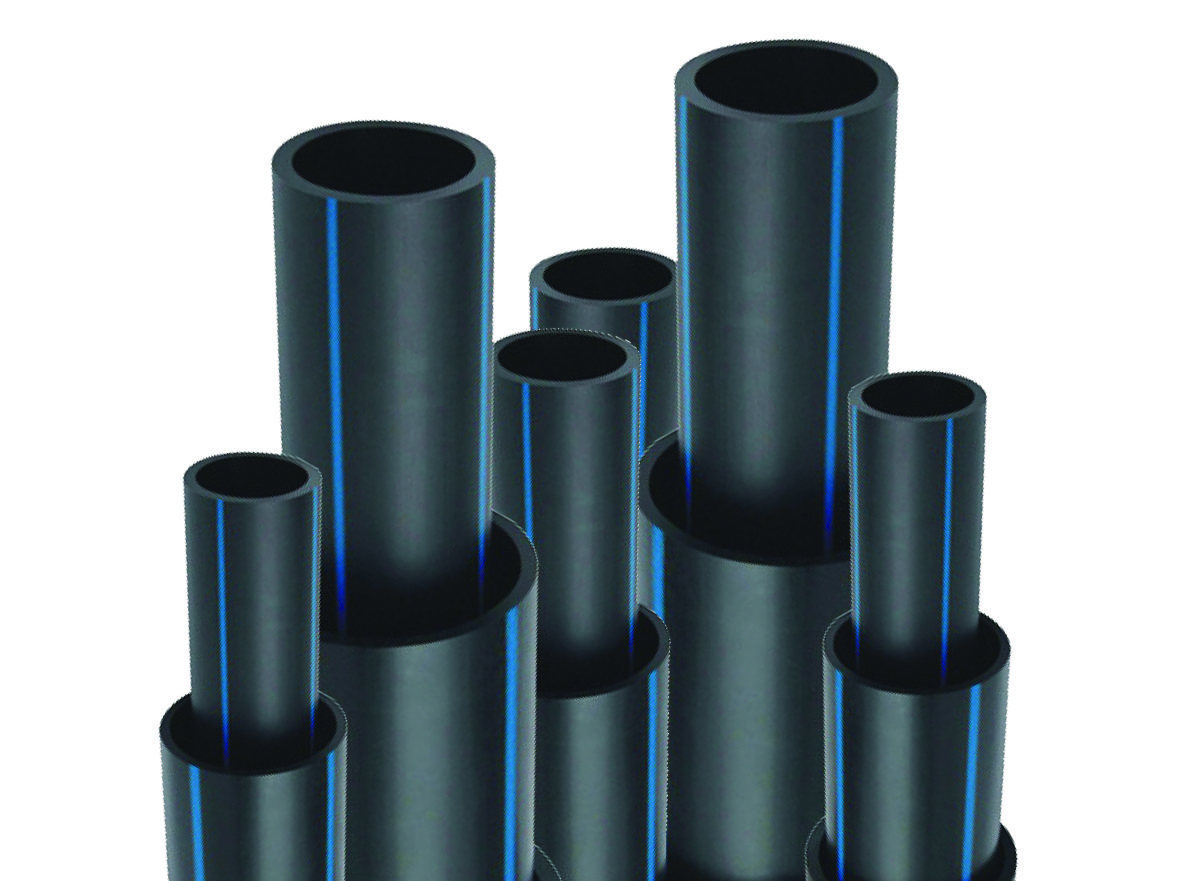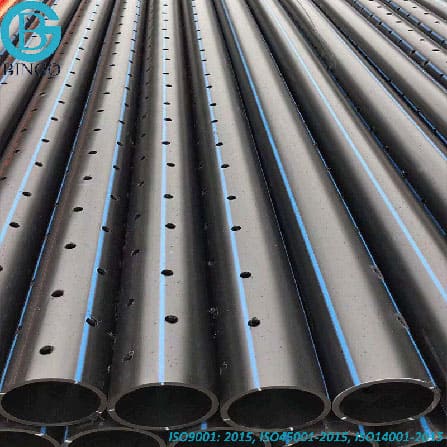A Comprehensive Overview to the Different Uses of HDPE Pipeline in Construction and Sector
HDPE pipes have actually become a critical component in modern building and commercial applications. Their one-of-a-kind residential properties, such as resistance to corrosion and lightweight style, make them suitable for a vast array of usages. From supply of water systems to farming watering, HDPE pipes use remedies that enhance effectiveness and sustainability. Comprehending their varied applications is important for specialists looking to enhance framework. What details advantages do these pipelines offer each sector?
Supply Of Water and Circulation Systems
Water supply and distribution systems are important components of urban facilities, often counting on high-density polyethylene (HDPE) pipes for their resilience and efficiency. These systems transport safe and clean water from treatment facilities to customers, guaranteeing access and security. HDPE pipelines are preferred for their resistance to corrosion, chemicals, and extreme temperature levels, which boosts their long life and reduces maintenance expenses. Furthermore, their light-weight nature enables easier installation and transportation, making them perfect for different metropolitan and rural applications.
The adaptability of HDPE pipelines allows them to be mounted in tight areas and around obstacles, lessening the demand for extensive excavation (American Plastics HDPE Pipe for Oilfield). Furthermore, their smooth interior surface decreases rubbing losses, improving water circulation rates. As cities remain to expand, the need for trustworthy supply of water systems enhances, positioning HDPE pipelines as a lasting service for contemporary facilities projects. Their tested performance history makes them a preferred choice among designers and metropolitan planners alike
Wastewater Administration and Therapy
Effective wastewater management and therapy are vital for maintaining public health and ecological high quality. HDPE pipelines play a crucial duty in this process as a result of their sturdiness, resistance to deterioration, and ability to stand up to rough chemicals. These pipes are generally made use of in various applications, consisting of sewage systems, stormwater water drainage, and wastewater treatment centers. Their lightweight nature assists in easier setup and transportation, minimizing labor expenses and time.
Additionally, HDPE pipelines have a smooth indoor surface that decreases rubbing loss, promoting efficient flow rates. They are additionally less prone to leakages and failures contrasted to standard products, making sure that impurities are had efficiently. Additionally, their versatility permits for adaptability in various dirt problems, making them suitable for diverse environmental setups. As sectors increasingly focus on sustainable techniques, using HDPE pipes in wastewater monitoring systems straightens with objectives for reducing environmental influence and enhancing source healing.
Agricultural Watering Solutions
In agricultural settings, efficient irrigation remedies are essential for optimizing crop returns and handling water sources. HDPE (High-Density Polyethylene) pipelines play an important role in contemporary irrigation systems due to their resilience, adaptability, and resistance to corrosion. Their capability to stand up to high stress makes them optimal for both surface area and subsurface watering applications, making sure consistent water circulation throughout areas.
Farmers can make use of HDPE pipes in drip irrigation systems, which deliver water straight to plant roots, decreasing wastage and advertising healthy and balanced development. Additionally, these pipes are light-weight and very easy to install, minimizing labor prices and installment time. Their lengthy life-span and reduced maintenance needs better boost their charm in agricultural methods.
HDPE pipes are eco friendly, as they can be recycled and do not leach harmful chemicals into the dirt. This makes them a lasting my website selection for farmers intending to adopt eco-friendly agricultural approaches while making the most of efficiency.
Industrial Applications and Procedures
Adaptability is a hallmark of HDPE pipes, making them vital in numerous industrial applications and procedures. These pipes are extensively used in chemical processing markets due to their exceptional resistance to a large range of destructive compounds. HDPE's lightweight nature, incorporated with high tensile strength, permits for simple installment and long-term performance in demanding environments.
In the oil and gas field, HDPE pipes play a necessary function in transferring hydrocarbons and gases, many thanks to their longevity and versatility - hdpe pipe in stock Midland TX. Furthermore, they are employed in mining procedures for the transport of slurry and other materials, where standard piping systems might fail
HDPE pipelines are increasingly utilized in producing facilities for water supply lines and wastewater monitoring. Their ability to endure extreme temperatures and pressures makes them suitable for a selection of industrial processes. Generally, HDPE pipelines add considerably to effectiveness and safety throughout varied commercial applications.
Stormwater Management and Water Drainage Solutions
Stormwater management and water drainage systems are essential elements in urban framework, developed to manage excess rains and lower flooding threats. High-density polyethylene (HDPE) pipes are increasingly used in these systems because of their longevity, versatility, and resistance to rust. These pipes efficiently transport stormwater far from booming areas, minimizing surface drainage and protecting against waterlogging.
HDPE's lightweight nature helps with much easier installment, minimizing labor prices click reference and construction time. Additionally, its resistance to chemicals and ecological stressors assurances long life and dependability in various environments. Along with conventional drainage applications, HDPE pipes are also utilized in innovative solutions such as green framework, that includes rainfall gardens and absorptive sidewalks.

Regularly Asked Inquiries
Just How Does HDPE Pipeline Compare to PVC Pipeline in Expense?
Generally, HDPE pipe tends to be extra expensive than PVC pipeline because of its boosted durability and flexibility. Nonetheless, lasting expense factors to consider, such as upkeep and lifespan, may prefer HDPE in specific applications.

What Is the Life Expectancy of HDPE Pipeline Under Numerous Conditions?
HDPE pipes typically have a life expectancy of 50 to 100 years, relying on ecological problems, installment practices, and use. Factors such as temperature level, dirt kind, and exposure to chemicals can greatly influence their resilience.
Can HDPE Water Lines Be Recycled After Use?
Yes, HDPE pipes can be recycled after usage. The recycling procedure includes melting down the product, enabling it to be repurposed into brand-new products, therefore advertising sustainability and decreasing ecological influence associated with plastic waste.
Are There Any Type Of Certain Installation Challenges With HDPE Pipelines?
Installment difficulties with HDPE pipelines include appropriate jointing strategies, making certain sufficient trench conditions, and taking care of thermal expansion. Additionally, proficient labor is required to handle specific tools, which can make complex the installation procedure in various atmospheres.

What Accreditations Should I Look for When Buying HDPE Pipings?
When buying HDPE pipelines, one should look for accreditations such as ASTM, AASHTO, and ISO, which confirm top quality and compliance with industry requirements, guaranteeing durability and efficiency in numerous applications. - more Pipe Supplier American Plastics Midland